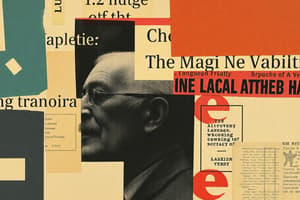Podcast
Questions and Answers
Standard English is the most widespread language in the world.
Standard English is the most widespread language in the world.
False (B)
The concept of World Englishes (WE) suggests that all languages are equal in prestige.
The concept of World Englishes (WE) suggests that all languages are equal in prestige.
False (B)
Non-native speakers of English do not draw upon it in relation to their linguistic and socio-cultural contexts.
Non-native speakers of English do not draw upon it in relation to their linguistic and socio-cultural contexts.
False (B)
Uychoco and Santos (2018) disagreed with the idea of World Englishes (WE).
Uychoco and Santos (2018) disagreed with the idea of World Englishes (WE).
McCrum et.al (1986) highlighted that all languages are equal in functionality and prestige.
McCrum et.al (1986) highlighted that all languages are equal in functionality and prestige.
English has impacted societies only in the cultural aspect.
English has impacted societies only in the cultural aspect.
Casual register is the most formal register of language.
Casual register is the most formal register of language.
Intimate register is commonly used in public and professional situations.
Intimate register is commonly used in public and professional situations.
Personal e-mails and friendly letters often make use of casual register.
Personal e-mails and friendly letters often make use of casual register.
British English and American English are equal in terms of phonology, vocabulary, spelling, and grammar.
British English and American English are equal in terms of phonology, vocabulary, spelling, and grammar.
The most intimate form of language is the casual register.
The most intimate form of language is the casual register.
Slang and colloquialisms are often found in casual register.
Slang and colloquialisms are often found in casual register.
Educated Filipinos aim to have an American English accent.
Educated Filipinos aim to have an American English accent.
Filipinos consistently use the /æ/ sound in words like 'mask' as in American English.
Filipinos consistently use the /æ/ sound in words like 'mask' as in American English.
Filipinos do not distinguish between the /s, z/ and /ʃ, ʒ/ sounds, resulting in words like 'azure' being pronounced as 'ayshure'.
Filipinos do not distinguish between the /s, z/ and /ʃ, ʒ/ sounds, resulting in words like 'azure' being pronounced as 'ayshure'.
Interdental /ɵ, ð/ sounds are often replaced by /t, d/ by Filipinos, so 'three of these' is spoken as 'tree of dese'.
Interdental /ɵ, ð/ sounds are often replaced by /t, d/ by Filipinos, so 'three of these' is spoken as 'tree of dese'.
Language is not a cultural component that can serve as a bridge to understand people around the world.
Language is not a cultural component that can serve as a bridge to understand people around the world.
Intercultural communication only involves interaction between people of different races.
Intercultural communication only involves interaction between people of different races.
Study Notes
Language Varieties and Registers
- English is the most widespread language in the world, crossing national boundaries and impacting societies in various facets, including education, politics, trade, economy, technology, and culture.
World Englishes (WE)
- The concept of World Englishes (WE) suggests that all languages are equal in functionality, but not in prestige.
- WE acknowledges that English has penetrated societies and has impacted them in many ways.
Language Registers
- There are five common types of language registers: casual, intimate, formal, frozen, and consultative.
Casual/Informal Register
- This register is conversational in tone, used among and between friends, and includes general vocabulary, slang, and colloquialisms.
- Examples of casual register include personal emails, phone texts, short notes, friendly letters, most blogs, diaries, and journals.
Intimate Register
- This register is used by lovers and is the most intimate form of language, often avoided in public and professional situations.
Varieties of English
- British English and American English are the two most well-known varieties of English, differing in phonology, vocabulary, spelling, and grammar.
- The two varieties have distinct differences in phonology and vocabulary, with British English having a distinct pronunciation of /r/ and American English having a distinct vowel contrast in words like sheep/ship and full/fool.
Features of Philippine English
- Educated Filipinos aim to emulate an American English accent but struggle with vowel contrasts and phonological differences.
- Filipino English often lacks the /æ/ sound in words like "mask" and uses /ɑ/ instead.
- The distinction between /s, z/ and /ʃ, ʒ/ is not made in Filipino English.
Studying That Suits You
Use AI to generate personalized quizzes and flashcards to suit your learning preferences.
Description
Learn about the importance of different language varieties in spoken and written language, identify common types of written and spoken language registers, and engage in an activity demonstrating the various varieties of spoken English.




